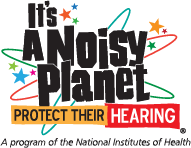In 2013, a series of ads appeared in New York City subway cars, on local radio stations, and on the Internet reminding people to turn down the volume on their headphones and earbuds. The ads, part of a campaign sponsored by the New York City Department of Health and Mental Hygiene, were meant to encourage New Yorkers to protect their hearing — both now and in the future — by turning down the volume on their personal listening devices.

The campaign’s tagline, “Turn down your music before you can’t hear it anymore,” is a clear call to action.
Exposure to sounds that are too loud or loud sounds that last a long time can cause noise-induced hearing loss. If you are exposed to loud sounds at or above 85 A-weighted decibels (dBA) on a regular basis, you put yourself at risk for permanent hearing loss. As New York City Health Commissioner Dr. Thomas Farley said, “Listening to headphones at high volume for too long can damage your hearing. If you want to continue to enjoy music in the future, turn down the volume today.”
Noise-induced hearing loss has only recently been understood as a serious public health problem. According to a New York City Community Health Survey [PDF – 327 KB] released in July 2013, New Yorkers 18 to 44 years old who admit to heavy headphone use are more than twice as likely as light-to-moderate or nonusers of headphones to report hearing problems.
The good news is that noise-induced hearing loss is preventable. The New York City Department of Health and Mental Hygiene issued headphone use recommendations that we can all follow:
- Reduce the volume, limit listening time, and take regular breaks.
- Never listen at maximum volume and don’t turn the volume up to drown out external noise.
- Use volume-limiting features on your personal listening devices.
- Know the early signs of hearing loss and ask a doctor for a hearing test if you have trouble hearing conversations; if you increasingly need to turn up the volume on the TV, radio, or your music player; or if you experience ringing in your ears.
If you (or someone you know) might be experiencing hearing loss caused by noise, visit the National Institute on Deafness and Other Communication Disorders (NIDCD) website to take a brief, 10-question test to help determine if you should have your hearing evaluated by a medical professional. The NIDCD, part of the National Institutes of Health, conducts the Noisy Planet campaign.
Last Updated Date



